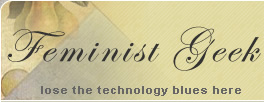Home >
about the site
This site was inspired by a discussion with Kathryn Kish Sklar about her keynote address on The Centrality of Feminisms in American History, 1775-2000 at the 20th Anniversary Celebration of the Huntington Library Women's Studies Program in March 2004.
That discussion led to the development of a hands-on technology workshop session at the Thirteenth Berkshire Conference on the History of Women in June 2005 entitled Crossing Geography, Culture and Time with Technology - Engaging in Women's and Gender History @ the Turn of the 21st Century. The session allowed Berks attendees, the session moderator, and one on-site presenter, Susan Kullmann, (and Internet guests) to participate in an online meeting with with remote presenters across the country who use computer technology in innovative ways; the presenters were at Macromedia headquarters in San Francisco, Harvard University's Library in Boston, and the History Department at George Mason University in Fairfax.
I am indebted to Kitty Sklar, the Huntington Library Women's Studies Steering Committee, Ellen Wagner, Nancy Parker, the Berkshire Conference on the History of Women's Program Committee, and the UCLA Center for the Study of Women for their direct and indirect encouragement of this site.
about the web developer
I gained an early appreciation for computer technology as a graduate student in history at Carnegie Mellon University in the late '70s. I wrote my dissertation on a mainframe computer using a "homegrown" CMU word-processing program. The back-up tape of my 1981 thesis on Women's Role in the Quest for Justice in American History: Civic Education Curriculum was in my office in a protective metal container until it was destroyed in the Tubbs Fire in 2017.
Inputting the dissertation text was cumbersome, similar to coding HTML. However, the flexibility and overall time savings were astounding. My dissertation contains several teaching units. Using a word-processor allowed me to "think differently" about the kinds of curriculum materials I could develop and field test. For example, the computer allowed me to neatly and easily format one-page role descriptions for a simulation of the 1972 Congressional Hearings on the Equal Rights Amendment. The final simulation printout was in a saleable format – but the early 1980s where not receptive to feminist simulation games.... Still, once the text was input, editing was so much easier than typewriter revisions. Chapter review copies for my advisors and the final printouts of my dissertation were free too. (Yes, there was a time when University Microfilms accepted dot matrix printouts!) After using a computer in grad school, it was difficult - well, honestly, impossible to go back to a typewriter.
I am a member of the cohort earning a history doctorate in what has been referred to as "the lost generation of History Ph.D.s" of the early 1980s. My career integrates instructional design skills learned at Carnegie Mellon with computer skills that are for the most part self-taught. My professional life includes working as a faculty member in history and women's studies, faculty development administrator, academic technologist and administrator, business owner, and photographer/writer.
As time permits, I hope to update this site!
-Susan
Susan Kullmann gratefully acknowledges UCLA's Center for the Study of Women, particularly Regina Lark and Chris Littleton, for support from 2004 to 2007 to develop and maintain this website.
